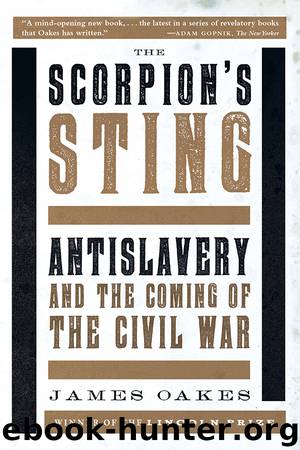The Scorpion's Sting by James Oakes

Author:James Oakes
Language: eng
Format: epub
Publisher: W. W. Norton & Company
Published: 2014-02-23T16:00:00+00:00
EPILOGUE:
Harriet Beecher Stowe and Her British Sisters
IT WAS NOVEMBER 1862 and Harriet Beecher Stowe was frustrated. Not with the progress of the Union war effort, or with President Lincoln’s supposedly slow path to emancipation, but with the failure of the British to understand what was going on in the United States. They were misreading Lincoln’s speeches. The Republican Party confused them. They didn’t grasp the Constitution. The British couldn’t see that the Civil War was and had always been a war over slavery. And having so deeply misunderstood the full meaning of the war, they were unable to recognize any of the impressive antislavery policies already implemented by Lincoln and the Republicans. In her frustration with so much British confusion, Stowe went back to her desk and once again lifted her mighty pen—the pen that had already done so much to hasten slavery’s demise. She would explain the Civil War to her British “sisters,” but she would do it publicly, conspicuously, in an article for the January 1863 issue of the Atlantic Monthly magazine.1
In truth, the British and the Americans never really understood each other’s position during the Civil War. Britons never fully appreciated the enduring effects of federalism and of the compromises the American Founders had made with slavery when they drafted a new Constitution in 1787. It had been nearly a century since an English judge, sitting on the Court of King’s Bench, had ruled that when slaves set foot on English soil they ceased to be the property of their masters, setting in motion the disappearance of slavery from the island of England. Why, Britons wondered, were courts in the United States still protecting slavery rather than undermining it? It had been more than a generation since Parliament, by the mere passage of a statute, abolished slavery throughout the British Empire. Why couldn’t Congress do the same thing in the United States?
Because most Americans—from the most radical opponents of slavery to the most extreme of slavery’s defenders—took it for granted that the Constitution did not allow the federal government to interfere with slavery in the states where it existed. All antislavery politics started from that premise, but the British didn’t really understand. So when Secretary of State William Seward told his British counterparts that the Union could not, constitutionally, prosecute a war for the purpose of abolishing slavery, the British mistakenly thought he was disavowing any desire to get slavery abolished. And when Lincoln said that his overriding purpose was to restore the Union, the British once again misread this as evidence that the president thought the war had nothing to do with slavery.
The misunderstanding went both ways. Northerners never understood that by recognizing the belligerent status of the Confederacy at the beginning of the war, Britain was actually aiding the Union. It meant that Britain would respect the northern embargo of southern ports. The Americans consistently misinterpreted the British move as evidence that they were itching to recognize the Confederacy itself when, in fact, supporters of
Download
This site does not store any files on its server. We only index and link to content provided by other sites. Please contact the content providers to delete copyright contents if any and email us, we'll remove relevant links or contents immediately.
| General | Discrimination & Racism |
Nudge - Improving Decisions about Health, Wealth, and Happiness by Thaler Sunstein(7678)
The Fire Next Time by James Baldwin(5409)
iGen by Jean M. Twenge(5398)
Adulting by Kelly Williams Brown(4552)
The Sports Rules Book by Human Kinetics(4367)
The Hacking of the American Mind by Robert H. Lustig(4355)
The Ethical Slut by Janet W. Hardy(4232)
Captivate by Vanessa Van Edwards(3828)
Mummy Knew by Lisa James(3670)
In a Sunburned Country by Bill Bryson(3524)
The Worm at the Core by Sheldon Solomon(3468)
Ants Among Elephants by Sujatha Gidla(3450)
The 48 laws of power by Robert Greene & Joost Elffers(3203)
Suicide: A Study in Sociology by Emile Durkheim(3002)
The Slow Fix: Solve Problems, Work Smarter, and Live Better In a World Addicted to Speed by Carl Honore(2990)
The Tipping Point by Malcolm Gladwell(2896)
Humans of New York by Brandon Stanton(2860)
Handbook of Forensic Sociology and Psychology by Stephen J. Morewitz & Mark L. Goldstein(2689)
The Happy Hooker by Xaviera Hollander(2678)
